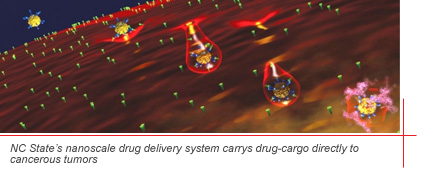

NC State Startup, ZettaCore, Launches Molecular Interface Technology >>
Targeted Intracellular Therapeutics >>
In 2009 , Small Times conducted a survey designed to evaluate which institutions are the “best of the best” in micro- and nanotechnology. The rankings are based on an indepth questionnaire that gauges eachuniversity’s capabilities and strengths, compiled into two categories: research and commercialization. NC State ranked THIRD in the NATION in successful commercialization of nanotechnologies and TENTH in the NATION for nanotechnology research. View the full report: Launch Small Time Survey in pdf.
:::: NC State Startup, ZettaCore, Launches Molecular Interface Technology ::::
 In April of 2009, ZettaCore Inc., a developer of molecular electronics, announced their trademarked Molecular Interface (MI) technology. This nano treatment technology makes possible dramatic improvement in interconnect density without requiring expensive and often time-consuming introduction of new materials and processes.
In April of 2009, ZettaCore Inc., a developer of molecular electronics, announced their trademarked Molecular Interface (MI) technology. This nano treatment technology makes possible dramatic improvement in interconnect density without requiring expensive and often time-consuming introduction of new materials and processes.
System level interconnect is a bottleneck to the scaling of semiconductor devices and digital systems. ZettaCore MI(TM) technology enables deposition of copper on smooth dielectric, and lamination of dielectric on smooth copper in high-performance IC substrates, HDI boards, high-speed boards, flexible printed circuit boards, and wafer level packaging. Since surface roughening is eliminated, customers can realize finer line/space dimensions and improve signal integrity while using conventional materials and processes.
ZettaCore was founded in 1999 by NC State researchers Jonathan Lindsey, Veena Misra, Wentai Liu and Eric Rotenberg, along with two colleagues at the University of California at Riverside. The team's focus was to create tiny supercomputers by incorporating "molecular storage" into standard microelectronic circuitry, using molecules synthesized in a lab at NC State. Instead of using silicon devices as memory storage elements, they used porphyrin molecules with functional properties that remain the same at any scale. At only two nanometers across, these molecules can be much more densely and inexpensively packed on a chip.
Learn more via Zettacore's website: http://www.zettacore.com/
 Targeted Intracellular Therapeutics ::::
Targeted Intracellular Therapeutics ::::
NC State researchers are literally working to develop a cure for cancer using nanotechnology. Dr. Steve Lommel, Professor of Plant Pathology and Genetics and Associate Dean of the College of Agriculture & Life Sciences, and Dr. Stefan Franzen, Professor of Biophysical and Biological Chemistry, are using a nanoscale drug delivery system to carry drug-cargo directly to cancerous tumors without adverse effects on innocent cells. The technology uses natural replication of a plant virus that happens to be perfectly architected for drug-delivery purposes.
The best chemistry-based technologies have been as yet unable to achieve the equivalent to what this plant virus has achieved through millions of years of evolution, such as the ability to: form endosomes and enter cancer cells; sense the intracellular environment and initiate a process leading to the release of the contents of its cargo chamber; and delay this release long enough to enable the secondary targeting of intracellular structures, such as the nucleus.
In December of 2008, Lommel and Franzen spun-out a company, NanoVector Inc., based on their platform technology: "NanoVector investors expect the technology, if proven effective in the clinic, could cure some forms of cancer -- and bring major investment from product-hungry large pharmaceutical companies." NanoVector was named "Early Stage Company of the Year" in November 2008 by NCTA. NC State's founders are partnering globally to advance this breakthrough research.
Learn more via NanoVector's website: http://www.nanovectorinc.com/